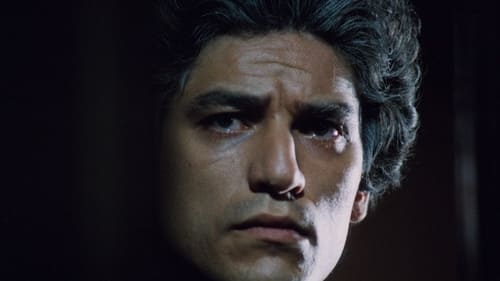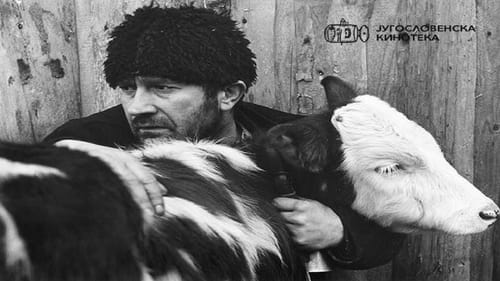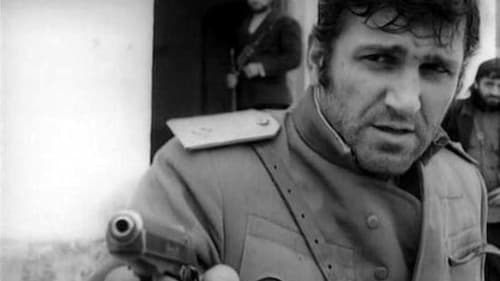
Writer
A successful man, a television presenter is living his dignified and comfortable life. And then, one night in the parking lot he gets beaten up. He does not know who attacked him, does not know why he was attacked. When a few days later he experiences another attack, his life begins to change: friends are suspicious, he gets a promotion, his girlfriend doubt his sanity ... lost, he wanders through the dark streets at night and searching for the assailants. On one such night, and I suddenly raises his hand to the unknown man...

Director
A successful man, a television presenter is living his dignified and comfortable life. And then, one night in the parking lot he gets beaten up. He does not know who attacked him, does not know why he was attacked. When a few days later he experiences another attack, his life begins to change: friends are suspicious, he gets a promotion, his girlfriend doubt his sanity ... lost, he wanders through the dark streets at night and searching for the assailants. On one such night, and I suddenly raises his hand to the unknown man...

Writer
Sveto mesto (Lugar Sagrado, 1990) é baseado num clássico literário, o conto de 1835 de Nikolai Gogol, 'Viy'. No entanto, Kadijevic usa-o apenas como ponto de partida para suas próprias explorações no lado negro do erotismo. A história de Gogol trata de Toma, um relutante estudante de teologia que é forçado a ler os Salmos por uma rapariga morta durante três noites seguidas. Enquanto isso, forças sobrenaturais tentam agarrá-lo do Círculo Sagrado desenhado no chão da igreja. Kadijevic adapta e enriquece 'Viy' inventando um novo pano de fundo para a bruxa-rapariga e seu pai. A rapariga morta, Catherine (involuntariamente morta no prólogo, enquanto na forma de uma bruxa), é referida como uma "santa" e seu pai é um homem duro e desagradável. Kadijevic afasta-se da história original e introduz um excesso de perversidade e horror que lembra mais o gótico anglo-americano do que as tentativas eslavas mais leves de um modo semelhante.

Director
Sveto mesto (Lugar Sagrado, 1990) é baseado num clássico literário, o conto de 1835 de Nikolai Gogol, 'Viy'. No entanto, Kadijevic usa-o apenas como ponto de partida para suas próprias explorações no lado negro do erotismo. A história de Gogol trata de Toma, um relutante estudante de teologia que é forçado a ler os Salmos por uma rapariga morta durante três noites seguidas. Enquanto isso, forças sobrenaturais tentam agarrá-lo do Círculo Sagrado desenhado no chão da igreja. Kadijevic adapta e enriquece 'Viy' inventando um novo pano de fundo para a bruxa-rapariga e seu pai. A rapariga morta, Catherine (involuntariamente morta no prólogo, enquanto na forma de uma bruxa), é referida como uma "santa" e seu pai é um homem duro e desagradável. Kadijevic afasta-se da história original e introduz um excesso de perversidade e horror que lembra mais o gótico anglo-americano do que as tentativas eslavas mais leves de um modo semelhante.

Co-Writer
The story about the death of Karadjordje, the elected leader of the First Serbian Uprising that aimed at liberating Serbia from the Ottoman Empire.

Director
The story about the death of Karadjordje, the elected leader of the First Serbian Uprising that aimed at liberating Serbia from the Ottoman Empire.

Director
After being ridiculed by his surrounding, a man who makes the wooden sculptures leaves the village with his best man to live high up in the mountain and devote to his hobby.

Director
On her deathbed, the sister tries to help her brother who, burdened with his poor background, can't figure out his life's directions after completing studies.

Director
A story about young man who, after the conflict with his uncle, sets off to emigration.

Director
Two faces of an upper-class, urban family, centered around young married couple.

Writer
Vuko, a young servant of Kotor prince, makes entourage with his brother and friends in order to obtain for the daughter of Venetian Doge for the prince's son. They spend seven weeks of drinking, whoring and without thoughts of anything else. And then, one morning, running through narrow streets before the army, Vuko accidentally witnesses the fight between the knights and the guards. Vuko falls into the hands of guards, and finds himself imprisoned. Even without knowing beforehand who is Maltese, Vuko is being sworn in on the eve of execution, so that the knight would deceive his miserable destiny at least a bit.

Director
Vuko, a young servant of Kotor prince, makes entourage with his brother and friends in order to obtain for the daughter of Venetian Doge for the prince's son. They spend seven weeks of drinking, whoring and without thoughts of anything else. And then, one morning, running through narrow streets before the army, Vuko accidentally witnesses the fight between the knights and the guards. Vuko falls into the hands of guards, and finds himself imprisoned. Even without knowing beforehand who is Maltese, Vuko is being sworn in on the eve of execution, so that the knight would deceive his miserable destiny at least a bit.

Writer
A história segue o jovem Strahinja que está apaixonado por uma belezalá da aldei, Radojka, mas a sua relação tem um obstáculo - o pai dela, Ivan, que considera Strahinja, nada mais que um fracassado. Para provar que ele é capaz de cuidar de si mesmo e de sua futura esposa, Strahinja concorda em aceitar uma vaga no moinho da aldeia... Mas, o moinho é conhecido como um lugar onde ninguém conhece o amanhecer vivo...

Director
A história segue o jovem Strahinja que está apaixonado por uma belezalá da aldei, Radojka, mas a sua relação tem um obstáculo - o pai dela, Ivan, que considera Strahinja, nada mais que um fracassado. Para provar que ele é capaz de cuidar de si mesmo e de sua futura esposa, Strahinja concorda em aceitar uma vaga no moinho da aldeia... Mas, o moinho é conhecido como um lugar onde ninguém conhece o amanhecer vivo...

Production Design
A traveler is drawn by a siren song to a foreboding castle. When a young boy warns him away from it, he is run over by a carriage carrying the enigmatic lady of the manor. She begs the traveler's assistance with the boy and takes him to her castle where she engages him in a supernatural, psycho-sexual pas de deux that leads him to the horrifying secret of the Maiden's Tune.

Writer
A traveler is drawn by a siren song to a foreboding castle. When a young boy warns him away from it, he is run over by a carriage carrying the enigmatic lady of the manor. She begs the traveler's assistance with the boy and takes him to her castle where she engages him in a supernatural, psycho-sexual pas de deux that leads him to the horrifying secret of the Maiden's Tune.

Director
A traveler is drawn by a siren song to a foreboding castle. When a young boy warns him away from it, he is run over by a carriage carrying the enigmatic lady of the manor. She begs the traveler's assistance with the boy and takes him to her castle where she engages him in a supernatural, psycho-sexual pas de deux that leads him to the horrifying secret of the Maiden's Tune.

Director
A terrified young man is running away from the mysterious man in a black coat and a bowler hat. He finds the asylum in the nearby mental hospital, where the doctor takes care of him. However, one cannot escape from his fate.

Director
Set just before the end of WWI on the abandoned farm in Vojvodina, the story follows the wife of an Austo-Hungarian colonel of a battered battalion who pays him a visit, only to experience the true Empire's decline through the meeting with disillusioned army.

Dialogue
Set just before the end of WWI on the abandoned farm in Vojvodina, the story follows the wife of an Austo-Hungarian colonel of a battered battalion who pays him a visit, only to experience the true Empire's decline through the meeting with disillusioned army.

Writer
Set just before the end of WWI on the abandoned farm in Vojvodina, the story follows the wife of an Austo-Hungarian colonel of a battered battalion who pays him a visit, only to experience the true Empire's decline through the meeting with disillusioned army.

Adaptation
A drama set in the Middle Ages, based on the folk poem 'Bolani Dojcin', about a sick nobleman who uses the last ounce of strength to put a knight's armor and go, alone, to fight a gang who ravaged his city and drove his sister to death.

Writer
A drama set in the Middle Ages, based on the folk poem 'Bolani Dojcin', about a sick nobleman who uses the last ounce of strength to put a knight's armor and go, alone, to fight a gang who ravaged his city and drove his sister to death.

Director
A drama set in the Middle Ages, based on the folk poem 'Bolani Dojcin', about a sick nobleman who uses the last ounce of strength to put a knight's armor and go, alone, to fight a gang who ravaged his city and drove his sister to death.

Producer
In Vojvodina during the war, a partisan commander Zarki fell into the hands of the local Germans. They bound him in chains and take him from one village to another, torturing him in public so he could tell the names from his movement. Bewildered by his resisting power, the Germans tend to break him down and destroy the pride which is his answer to their torture. Frenzied of powerlessness, they ultimately choose the most horrifying death - they buried him alive in the sand that will cover the last trait of him, but he died victorious: He died for his thing.

Writer
In Vojvodina during the war, a partisan commander Zarki fell into the hands of the local Germans. They bound him in chains and take him from one village to another, torturing him in public so he could tell the names from his movement. Bewildered by his resisting power, the Germans tend to break him down and destroy the pride which is his answer to their torture. Frenzied of powerlessness, they ultimately choose the most horrifying death - they buried him alive in the sand that will cover the last trait of him, but he died victorious: He died for his thing.

Director
In Vojvodina during the war, a partisan commander Zarki fell into the hands of the local Germans. They bound him in chains and take him from one village to another, torturing him in public so he could tell the names from his movement. Bewildered by his resisting power, the Germans tend to break him down and destroy the pride which is his answer to their torture. Frenzied of powerlessness, they ultimately choose the most horrifying death - they buried him alive in the sand that will cover the last trait of him, but he died victorious: He died for his thing.

Writer
Following the death of his female cousin Marija, Moma sets out to her house where only her aunt lives. The old woman remembers Marija's awkward temper that left her unmarried and even led to a suicide of one of her courters. Based on a novel written by Momčilo Nastasijević.

Director
Following the death of his female cousin Marija, Moma sets out to her house where only her aunt lives. The old woman remembers Marija's awkward temper that left her unmarried and even led to a suicide of one of her courters. Based on a novel written by Momčilo Nastasijević.

Director
A story of a farmer and his calf, the only survivors of the German WW2 punitive expeditions that passed through their village. While evading before the dangers of war, the farmer develops a deep attachment to his calf and tries to save it at all costs, but it wouldn't be much easier for them even after the liberation day.

Writer
In a Serbian village on Christmas Day in 1943, the Chetniks accept two downed American pilots and give them hospitality. However, finding out that the Germans are looking for pilots, the Chetniks change their attitude towards them.

Director
In a Serbian village on Christmas Day in 1943, the Chetniks accept two downed American pilots and give them hospitality. However, finding out that the Germans are looking for pilots, the Chetniks change their attitude towards them.




























